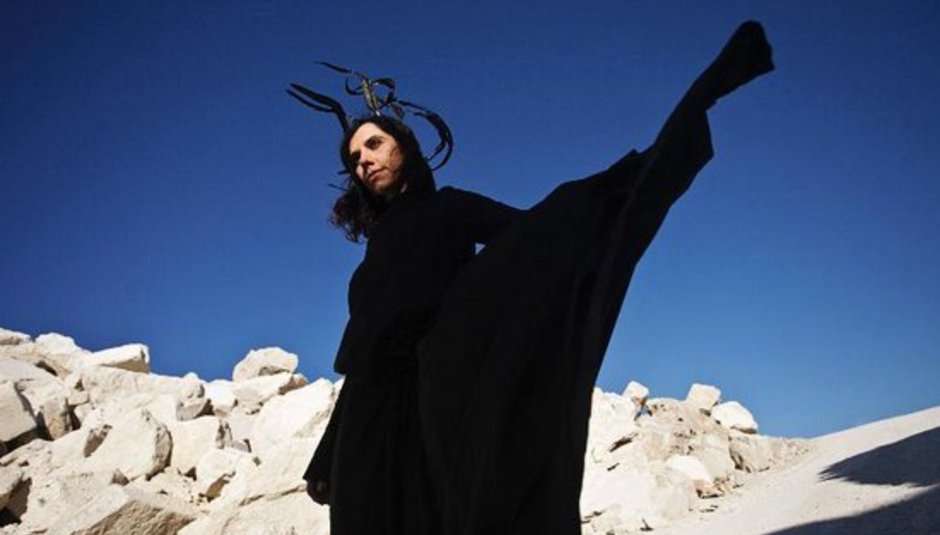Polly Jean Harvey’s illustrious career makes the kind of Herculean reading that causes our over-anxious generation of success-hungry twentysomethings to quake in its distressed leather army boots. At 41, she has released eight enviably diverse records, won the Mercury Music Prize in 2001 for one of them, Stories from the City, Stories from the Sea, been nominated for every music gong going, collaborated with the likes of Josh Homme and former beau Nick Cave and topped innumerable ‘Best Of Being Awesome’ polls. She has even scored a Broadway production of Hedda Gabler – and that’s all just a Wikipedia-crunching taster.
So when we first heard that the rock chameleon was addressing the nation and, more controversially, war on her new album, Let England Shake, we shouldn’t have been surprised. After all, PJ Harvey is one of the boldest musicians around – and not in a bleached-blond, bitch-at-you-on-Twitter sort of way. She starred on the cover of the NME in 1992 topless. She produced an entire album on her own, 2004’s Uh Huh Her. And she played the first (and very direct) single from Let England Shake on Andrew Marr’s television show when the then Prime Minister, Gordon Brown, was watching in the studio. It was just a month before the government elections.
As it happens, this, her ninth album, is her boldest yet. And as you might have guessed from its unapologetic title, she’s not exactly thrilled with her homeland’s latest oversees affairs.
Harvey returned once again to her birthplace, Dorset, to record Let England Shake. This time a nineteenth century church perched on a clifftop provided the album’s weighty atmosphere. Rarely a lone ranger, she was rejoined by long-standing musical comrades John Parish, whom she most recently collaborated with on 2009’s A Woman A Man Walked By, alongside similarly old friend Mick Harvey and producer Flood.
Predictably, the concept of ‘a war album’ throws up all kinds of erratic suppositions. Such hefty subject matter treads a wobbly tightrope between dogmatic Live 8-isms and groundbreaking socio-political commentary. However, Harvey is incredibly aware of being perceived as the former. When we meet her at a perfectly fitting opulent Victorian hideaway in Kensington, lined with gilded mirrors and crushed velvet draping – she is incredibly calm and thoughtful, yet expertly steers away from any exact indication of how she arrived at this intriguing album. And it is certainly not, she insists, a political album.
“I’ve always been somebody who’s very interested in what’s going on in the world, what’s happening in politics and what’s happening around us daily. But I’d never felt that I had reached the point as a writer, particularly of words, where I could express that well. Because I think that if you’re going to deal with such subject matter, you have to strike the right balance and do it well. I didn’t want to do it badly! And I didn’t feel confident enough to approach giant topics like conflict and one’s nation and war."
“This was the first time in my life where I began to try and do it and to see if it were possible. I’d reached a place with my word writing where I thought I might be able now at a stage in my life where I could attempt to deal with these weighty subjects. My whole thinking around the writing of the record was very much around the idea of ‘if I was appointed the official “song correspondent”, how would I bring the stories home, how would I relay them to people?’”
Harvey is reporter, not the preacher on Let England Shake, tied together cleverly by war photographer’s Seamus Murphy’s short documentary films that accompany each of its twelve tracks. Which is probably why Let England Shake has received top-notch reviews already. Q even awarded it five stars, calling the lyrics ‘remarkable’. But PJ bats this away lightly, dismissing claims that it’s her best work yet. “They’re all stepping stones, one to another, and it feels like a continuous piece of work, so I don’t see them as separate entities,” she says of her long and varied career. “But I do feel like, for this latest project, it’s turned out to be a strong piece of work and something I’ve been working towards for three or four years to get to the point where I do feel it’s arrived at the place I wanted it to.”
That place is, predictably, a dark one, continuing with the brooding exploration of the human psyche as on her previous albums. Like the piano-led ‘White Chalk’, it moves away from rock territory into a folkloric and, at times, gothic landscape. Harvey paints England with a tainted brush but at the same time, draws out a twisted sense of beauty, weighed down, as she sings, with the guilt of England’s dead, of its lost young soldiers and the unfathomable consequences of conflict abroad.
But rather than focus on a modern day homeland, of Blair and Bush and their “war on terrorism”, Let England Shake is laced with the country’s battle-strewn history and, especially, of its crumbling Empire during World War I. After all, does the way in which war affects those at home ever really change through the ages?
“I think it’s important to know about history, because the way that we behave with each other now, and the way that countries behave with each other now, is utterly steeped in what has gone before,” she says. “And I think it should be readily known because I think it will help understanding. I don’t think it’s known enough. But you can go back hundreds of thousands of years and look at who was warring with who at that time and it’s in a collective memory, it is, at some level. People remember these things, particularly different nations where that culture of bringing ones past right through to the present the whole time is more prevalent than here. But I think it’s very important that we know about history.”
But she insists that these feelings of alienation and disillusionment with one’s country are not limited to Englishness. Rather, the album draws comparisons with conflicts around the world (it’s no coincidence, we imagine, that the nineteenth century church it was recorded in stood on a cliff top looking out across the sea):
“I was trying to write words in such a way that other people can recognise similar emotions in the country that they’re in and their relationship with their own nation. I think we all have these feelings towards the country that we’re born into: feelings of love, but also feelings of great disappointment, shame and a desire to not be associated with it at all and, then again, a desire very much to be associated with it and its history. I think that push and pull is something that a lot of people experience. We all feel let down by our countries in one way or another and at different times in history. And particularly at the moment we’re going through such great changes and there’s an awful lot of turbulence going on, especially in the way that we feel about the country and what’s happening, so I hope it’s not limited to English people in that way.”
It’s fair to say that PJ Harvey doesn’t ever wish to make the creation of an album easy for herself. On White Chalk, she composed mainly on piano, which she readily admits wasn’t her strongest instrument at the time, while for the aforementioned Uh Huh Her she opted to play all of the instruments on the record herself and produce it entirely on her own with little previous experience. For Let England Shake, however, the lyrics proved her biggest challenge:
“I wrote purely words and nothing else for about two years. And during that whole time, would ask critical opinions from people whose opinions I respected and threw away a lot of words that weren’t working and ended up with some that I thought were and the ones that felt like a good balance.”
So too was discovering how they should be sung. At times Harvey sounds like a disturbed and screechy child, reminiscent of Joanna Newsom, as on the track simply named ‘England’. “It took me a long time to find the voice for this record, the way the narrator would deliver them, because to have sung it in a deep and womanly way would have destroyed them,” she reveals. Again, speaking of herself in the role of a journalist, she adds: “In a way, I wanted the voice to be quite unobtrusive but just to relay the story; almost like a witness, who is just narrating the stories and bringing them back from the place that they happened.”
The conflict in such stories – both the conditions of war and the love/hate relationship between country and countrymen – is a defining theme of the album. But it’s not just in terms of its subject matter. Moreover, there is a tension in Harvey’s composition itself, as imagery of a decaying country meets, dare we say it, cheery melodies and as old instruments clash with new ones, like on the auto-harp she used to write half of the songs.
“I had a very specific idea of what I was aiming for,” says Harvey. “After I’d written all the words, I knew that to make a sound that was going to add more weight to the words was not going to do them a good service because they were weighty enough as they were. I didn’t want to fall into that trap of coming across as too dogmatic or too self-important. The music had to offset the words entirely, so I was looking to make music that was quite indefinable, but very energetic and quite uplifting. I tried to find melodies that I could walk to or would want to sing along with. And that’s sort of how this sound arrived. I was using old instruments as well as very new instruments all mixed up together. It’s ended up being quite a peculiar sound, which I like.
“I composed the other batch of songs on guitar but using a variety of different effects to give it much more of a glass-like, watery sound. There are a lot of strings going on across the whole album! The auto-harp has many octaves of strings at your disposal just by touching and in some ways sounds like an orchestra all in itself with so many different harmonics firing off of it and likewise with the sounds I was using on the guitar. I wanted the sound to be quite difficult to pin down, because it feels like it’s, rather, a wash.”
‘Difficult to pin down’ is the definitive, if not purposeful, rule by which all of Harvey’s musical work seems to operate. Of course, for Harvey it’s much more organic than that, but with each album comes a new look, a different feel and a fresh direction. Once known for her elaborate performances, she reveals that her approaching show at former Art Deco theatre The Troxy in February will be, by contrast, incredibly modest:
“I always want the shows to visually represent the music well and for these songs, it will be really quite a stark, bare stage. It’s very simple; almost just a black box really, because I think the songs do everything they need to do for themselves.”
They do, PJ Harvey, they really do. Who knows what Gordon Brown was thinking when he watched her sing “The West's asleep…weighted down with silent dead/England's dancing days are done” on live television, but he will have definitely felt the shaky ride ahead.
PJ Harvey’s album Let England Shake is out on February 14 on Island Records. She plays at The Troxy on February 27 and at Portishead’s I’ll Be Your Mirror at Alexandra Palace on July 23.






















